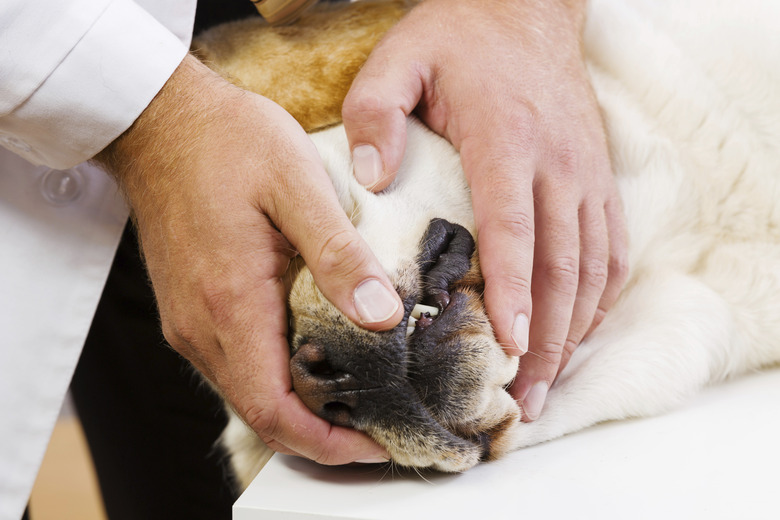UTI Symptoms In Dogs
Urinary tract infections occur in dogs when bacteria from outside the body travels into the urinary tract via the genital openings. The most common source of bacterial contamination of the genital area is from feces. Female dogs are more prone to suffering bacterial urinary tract infections because their anal and urinary tract openings are located closely together. Male anatomy largely prevents such contamination, making urinary tract infections much less likely in male dogs.
Itching to Pee
Itching to Pee
Many dogs with urinary tract infections remain asymptomatic, showing no outward signs of distress. Dogs who do suffer symptoms from a urinary tract infection may display increased urination or abnormal urination habits. She may ask to go out to relieve herself more often than usual, and produce only small quantities of urine. Your dog may begin urinating inside the house, in unusual places or during confinement. Urination may become painful, causing your dog to whimper or cry out. The urine may have a pungent or foul odor, or it may appear cloudy. If the urine contains blood it may be pink, red or brown in color.
Behavioral Oddities
Behavioral Oddities
If your dog's urinary tract infection becomes severe, your dog may become unwilling to exert herself unnecessarily. She may become lethargic, refuse to walk, run or jump or she may even develop a limp. Her appetite may decrease, yet her consumption of water may increase. Your dog may lick the genital area compulsively and her coat may become unkempt or develop a foul odor.
Compounding Issues
Compounding Issues
If your dog's urinary tract infection remains untreated, serious complications can arise including the formation of bladder or kidney stones, infertility or septicemia, a serious and potentially fatal systemic infection. If the urinary tract infection travels to the kidneys, your dog is at risk for developing a kidney infection that eventually can lead to total kidney failure. Untreated male dogs may develop a prostate infection, which can cause abscesses within the prostate and lead to systemic infection or chronic urinary tract infections.
Quenching the Fire
Quenching the Fire
The gold standard for treating your dog's urinary tract infection is the administration of a course of antibiotics. Your veterinarian will need to conduct a urinalysis to determine the specific bacteria involved in the infection. This will allow him to prescribe the appropriate antibiotic. Your dog's symptoms should subside within 48 hours of receiving her initial antibiotics. Administer the entire course of treatment and return to the vet for a follow-up urinalysis to ensure the infection has resolved.
Always check with your veterinarian before changing your pet's diet, medication, or physical activity routines. This information is not a substitute for a vet's opinion.
